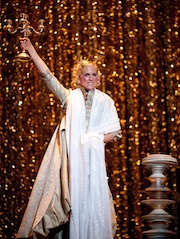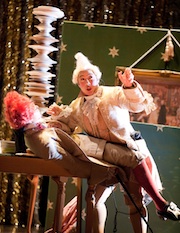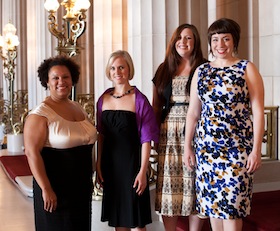
San Francisco loves a long-distance race, whether it’s Bay to Breakers or the Giants’ quest for the pennant. This month, though, another endurance event is taking place in the city — one that involves a different kind of performing elite. For young opera artists, the Merola Program offers the kind of intensive, high-powered training that might leave even seasoned athletes in the dust.
Founded on the assumption that stars are made, not born, the annual program has been cultivating new generations of opera artists for over half a century. With its specialized mix of study, coaching, and performance experience, Merola is regarded as one of the world’s premier opera training programs, as well as one of the most rigorous. And it gets results.
“It’s a fabulous program,” says Suzanne Rigden, a Canadian soprano currently midway through the 2011 program. “The bar is incredibly high, and you just have to pump it up. It’s challenging, but we grow so much here every day.”
Named for the San Francisco Opera’s first general director, Gaetano Merola, the program began during the 1954–1955 season and established its full training program in 1957. Phenomenally successful from the start, Merola has helped launch the careers of top stars such as Patricia Racette, Susan Graham, Thomas Hampson, Deborah Voigt, and Patrick Summers, among others.
“It’s a fabulous program.The bar is incredibly high.” – soprano Suzanne Rigden
Twenty-five artists — 20 singers, four apprentice coaches, and one apprentice stage director — arrived in June for this year’s program. They’ve already given two Schwabacher concerts; still to come is a full production of Rossini’s Barber of Seville with two alternating casts performing Aug. 4–7 at Herbst Theatre, and the Merola Grand Finale, featuring the singers in a program of arias, duets, and ensembles on Aug. 20 at the War Memorial Opera House.
White-Hot Commitment
Last week, the Barber casts were deep in rehearsals at Herbst. Led by conductor Mark Morash, the singers were in jeans and T-shirts; scenes were still being blocked, and director Roy Rallo stopped the action several times to tweak a gesture here, streamline the action there. But the singers were pouring their hearts into it. Anyone listening would have heard the skill, and the level of commitment, already on display.
“The performance isn’t the end result of the program; the end result is our growth as artists.” – bass-baritone John Maynard, of Orinda
When their lunch break came, Rigden, singing the role of Rosina in the first Barber cast, joined baritone John Maynard and bass Adam Lau to discuss the Merola experience, and their goals for the future.
Merola, says Rigden, offers comprehensive training. “They have a great faculty, and every resource that you could possibly need,” she says. “I didn’t even realize all the steps I was missing until I got here and saw what was available.” Maynard, who is singing the role of Doctor Bartolo in Barber, agrees. “It’s very education oriented,” says the baritone, who grew up in nearby Orinda. “The performance isn’t the end result of the program; the end result is our growth as artists. I came in transitioning from bass-baritone to more dramatic baritone repertoire, and the coaching staff has been great. They’re really tailoring the experience to my goal — which is to figure out, by the end of the summer, what good audition-repertoire is, what roles I should be looking at, which level of [opera] house I should be striving for at the moment, what roles I can do in the future. I’ve gotten a lot of very sound advice about where my voice is going, and that’s exactly what I wanted to learn.”

If the singers are in transition, so is the world of opera. The business is more competitive — and more technologically driven — than ever before. High-definition broadcasts have made singers much more visible, and the demand for singers who look beautiful and move well is a fact of life.
There’s a lot of ground to cover, and between voice coaching; language, diction, acting, and movement sessions; master classes; rehearsals; and performances, the participants stay in motion from morning to night. Fatigue is a risk. Yet these artists are driven. “It’s building stamina,” says Lau, cast as Don Basilio in the Barber production. “That’s important in this business. Each day builds up our endurance. And the level of support is tremendous. I don’t think I’ve ever been in a young artist program where you receive this amount of detail — from the way you wear your costumes, to how you should fall down in stage combat, to how you should be dramatically preparing a role for a 4,000-seat house. It’s all so valuable.”
Varieties of Talent Are Key
The Merola artists arrive with college and young artist training already behind them, according to Sheri Greenawald, general director of the San Francisco Opera Center, which oversees both the Merola and Adler fellowship programs.
“Each day builds up our endurance. And the level of support is tremendous.” – bass Adam Lau
“They bring their talent, and what training they’ve had up until this point,” says Greenawald, who came to the Opera Center from an international career as a soprano. “Certainly what Mark [Morash, director of musical studies] and I are looking for in our auditions is talent: vocal talent, musical talent, acting talent.”
Beyond that, she says there’s often something else — “a spark,” or a sense of potential that can be hard to define. “It may be less complete than it is in someone else,” she says. “But if there’s something there that we recognize, we want to take a look at it. It’s always about exploring, and helping them explore their own talent. That’s really what Merola’s about — helping them come to definitions of themselves.”

Merola hones those definitions, and directs their talents, in a supportive atmosphere — one in which they learn from one another, even as they’re building a support system for the future.
“The first thing I say to them is ‘Look around this room,’” says Greenawald, “‘because these are your colleagues. Twenty years from now, if you’re still in the business, you’ll be singing with these people.’”
Rigden, Maynard, and Lau all outline similar goals. In addition to polishing their audition arias and building a list of roles tailored to their individual voices, each hopes to eventually establish a professional career in Europe and at major American houses.
Each allows that there’s a long road ahead. For now, though, they’re benefiting from the training — and the camaraderie — of the Merola program.
“Everyone says that music is such an aggressive business,” says Lau. “But when it gets right down to it, it’s about making these connections. We’re all working hard, striving to improve. But we’re all running our own race.”

![Merola_Barber-4[1].jpg](/sites/default/files/styles/floated_content_270x/public/media/2011-08/Merola_Barber-4%5B1%5D.jpg?itok=xY61El4l)